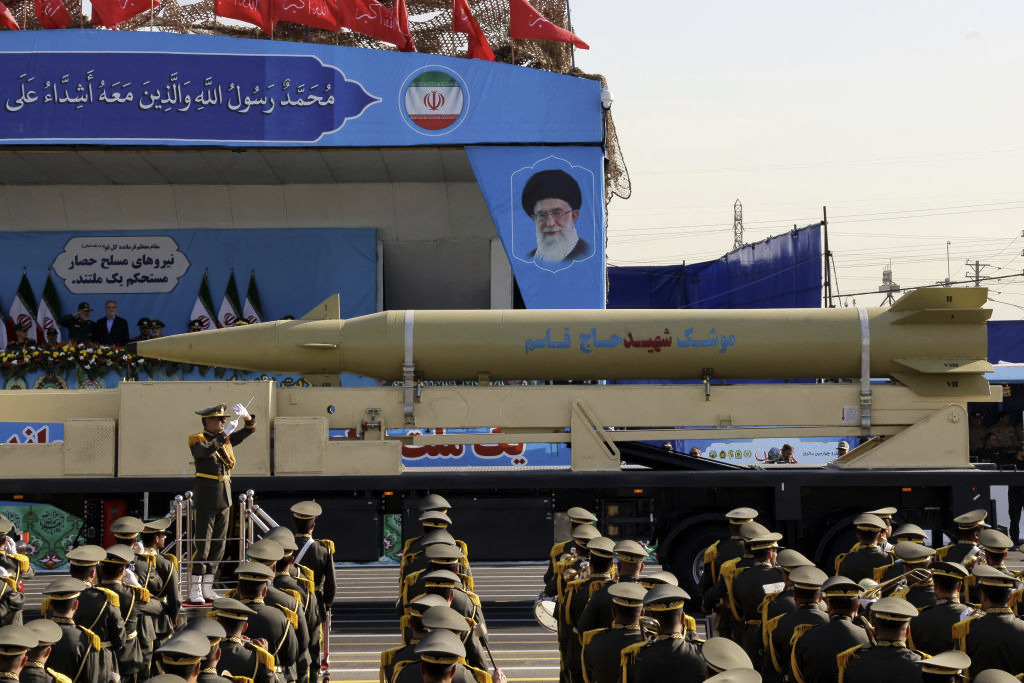 Hassan Nasrallah (Fot. REUTERS/Al-manar Tv)
Hassan Nasrallah (Fot. REUTERS/Al-manar Tv)
 Szejk, terrorysta, szara eminencja regionu. Kim był Hassan Nasrallah?
Szejk, terrorysta, szara eminencja regionu. Kim był Hassan Nasrallah?
Marta Urzędowska
Dla Zachodu znienawidzony terrorysta czyhający na bezpieczeństwo Izraela i destabilizujący region, dla zwolenników uwielbiany szejk, traktowany niemal jak prorok. Kim był Hassan Nasrallah, jeden z najważniejszych ludzi Bliskiego Wschodu, który w piątek zginął w izraelskim nalocie?
.
Dyskretny. Od lat mało kto go widywał. Mówiący cichym głosem, z siwą brodą i dobrotliwym spojrzeniem, w nieodłącznym turbanie na głowie, z zasady nie pokazywał się publicznie, słusznie bojąc się, że przy pierwszej okazji Izraelczycy go zabiją.
Jego przemówienia puszczane były zwolennikom Hezbollahu wyłącznie z wielkich telebimów rozstawianych w Dahiji, mateczniku Hezbollahu w Bejrucie, i nadawane w stacjach telewizyjnych i radiowych Partii Boga.
Hassan Nasrallah nie żyje. Zmienił Hezbollah z niepozornej bojówki w potężną armię
Nasrallah był szyickim duchownym wykształconym w irackim Nadżafie. Zwolennicy Hezbollahu traktowali go niemal jak proroka. Od 1992 r. stał na czele Hezbollahu, który dzięki jego ambicji i bliskim osobistym relacjom z Teheranem zmienił nie do poznania. Ze zwykłej bojówki utworzonej w latach 80., by walczyć z Izraelczykami okupującymi Liban, Nasrallah zrobił z Hezbollahu potężną armię i jeden z najważniejszych ruchów polityczno-społecznych Libanu, który dekadami mniej lub bardziej intensywnie walczył z Izraelem, jednocześnie trzęsąc całym Libanem.
Hezbollah, uznawany słusznie za państwo w państwie, zapewniał swoim zwolennikom służbę zdrowia, szkoły i usługi społeczne, choć dla Zachodu zawsze był tylko bandą terrorystów czyhających na bezpieczeństwo Izraela. Partia Boga nigdy nie usunęła z listy swoich celów do unicestwienia państwa Izrael i latami budowała swój imponujący arsenał pocisków, rakiet i dronów, by był w stanie poważnie zagrozić Izraelczykom.
Ambicje Nasrallaha nigdy nie kończyły się na Libanie. Jak jego potężni sponsorzy w Teheranie, lubił budować wpływy w całym regionie. To Hezbollah pomógł syryjskiemu dyktatorowi-szyicie wygrać wojnę domową, szyickim rebeliantom Huti w Jemenie odnosić sukcesy w wojnie z armią, a szyickim bojówkom w Iraku i Syrii nękać atakami sojuszników Izraela.
Hassan Nasrallah nie żyje. Miał 32 lata, gdy został przywódcą
Hassan Nasrallah urodził się w 1960 r. Dorastał w Bejrucie jako najstarszy z dziewięciorga dzieci sklepikarza. Jako nastolatek po wybuchu wojny domowej w 1975 r. dołączył do ruchu Amal, miejscowej szyickiej bojówki, po czym wyjechał do Iraku, gdzie uczył się w szyickim seminarium. Po powrocie na krótko wrócił do Amal, jednak szybko zapragnął pójść na swoje.
Razem z innymi bojownikami odłączył się od macierzystego ruchu, tworząc jego nową wersję, Islamski Amal, który od początku cieszył się wsparciem Teheranu marzącego o utworzeniu na miejscu swojego przyczółka walczącego z Izraelem, dzięki czemu wkrótce Amal stał się najważniejszą szyicką bojówką.
W 1985 r. oficjalnie ogłoszono powstanie Hezbollahu, który od początku jako głównych wrogów islamu wskazywał USA i Związek Radziecki, a jako główny swój cel – unicestwienie państwa Izrael.
Nasrallah od początku brylował w nowej grupie, błyskawicznie pnąc się po szczeblach kariery. Był kolejno jej przywódcą w Baalbek, potem w całej Dolinie Bekaa, a następnie w libańskiej stolicy, by w wieku zaledwie 32 lat zostać przywódcą całego Hezbollahu.
W ostatnim przemówieniu Nasrallah groził Izraelczykom nowymi atakami
W czasie ostatniej wojny w Strefie Gazy, rozpętanej atakiem Hamasu na Izrael, początkowo zachował zimną krew. Choć pochwalił Hamas, że zadali Izraelczykom duży cios, to podkreślał, że była to wyłącznie ich decyzja i że jego ludzi im nie pomogli. Jednak – by przypodobać się zwolennikom – kazał nękać północny Izrael atakami, które trwają do dziś. W sumie od jesieni ub. roku jego ludzie odpalili na Izrael tysiące rakiet, pocisków i dronów.
W ostatnich dniach wygłosił przemówienie, w którym ostro skrytykował ataki Izraela na Hezbollah, w ramach których w rękach bojowników wybuchły pagery i krótkofalówki zabijając kilkadziesiąt osób i raniąc tysiące. – Zemścimy się, bo przekroczyli wszystkie czerwone linie – zapowiadał wtedy przywódca Hezbollahu. – Jednak sposób odwetu, jego rozmiary, miejsce i czas zachowamy dla siebie, dla najbliższych kręgów naszego dowództwa – zapewnił.
Ponoć Izraelczycy do ostatniej chwili wahali się, czy go zabić. Dosłownie tuż przed atakiem plan miał zostać odwołany. Ale kiedy okazało się, że szef Hezbollahu jednak przyjechał na spotkanie do Bejrutu, pokusa okazała się zbyt silna. Po kilku godzinach obwieścili: “Hassan Nasrallah nie będzie już zagrażał światu”.
Red. Ludmiła Anannikova
Zawartość publikowanych artykułów i materiałów nie reprezentuje poglądów ani opinii Reunion’68,
ani też webmastera Blogu Reunion’68, chyba ze jest to wyraźnie zaznaczone.
Twoje uwagi, linki, własne artykuły lub wiadomości prześlij na adres:
webmaster@reunion68.com




